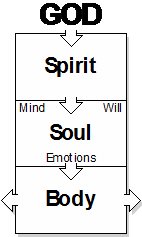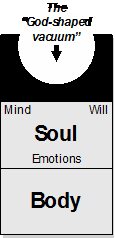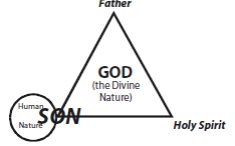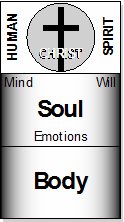5. Grace-Given Life to You
Related Media“But God, being rich in mercy, because of his great love with which he loved us, even though we were dead in transgressions, made us alive together with Christ – by grace you are saved! – and he raised us up with him and seated us with him in the heavenly realms in Christ Jesus…” (Ephesians 2:4-6)
Introduction
We stated in a previous lesson that from the time sin entered into mankind’s relationship with their Creator God, man had a spiritual problem that can be compared to death caused by a fatal disease: (1) Sin (“the disease” Romans 3:23) and (2) Death (“result of the disease” Romans 6:23). Man’s twofold problem demanded a twofold solution:
- For the problem of sin, man needs forgiveness and righteousness. Answer: Christ’s death (the cross). Mankind can now be cured of the disease.
- For the problem of death, man needs regeneration (the restoration of life). Answer: Christ’s resurrection. Mankind can now be given life that is forever.
The Gospel message included the answer to both spiritual problems and is simply illustrated by the quote by Ian Thomas (at right).
The powerlessness of much modern-day Christianity can be traced to its failure to clearly state and maintain two vital truths: (1) Christ’s finished work on the cross to secure our complete acceptance before God, and (2) “Christ in you” as the dynamic of daily Christian living.
As a result, the average Christian in our time has:
- A fairly solid understanding of God’s grace as it relates to his initial salvation experience.
- An inconsistent, wavering understanding of God’s grace in his ongoing life as a Christian.
- Next to no understanding of the significance of his having received the very life of God through the Holy Spirit.
Thus, spiritual immaturity reigns. Christians are often being led down a path of failure, discouragement, and despair by attempts to be perfected “by human effort.” (Galatians 3:1-5)
The previous two lessons covered our complete acceptance before God because of Christ’s finished work on the cross. The next two lessons will address the life given to us by Christ himself as our power for daily Christian living. Through this life, we experience freedom and joy!
Historical Insight: “The great difference between present-day Christianity and that of which we read in these letters [New Testament epistles] is that to us it is primarily a performance; to them it was a real experience. We are apt to reduce the Christian religion to a code or, at best, a rule of heart and life. To these men it is quite plainly the invasion of their lives by a new quality of life altogether. They do not hesitate to describe this as Christ living in them.” (J.B. Phillips, Introduction to Letters to Young Churches)
The Resurrection: God’s Solution to the Life & Death Issue
Day One Study
When God created man in his own image (Genesis 1:27), mankind was created with a body, a soul (conscious life made up of mind, emotions and will), and a spirit that enables every man and woman to relate to God. Man’s spirit is the source of his inner drives for love and acceptance, a sense of identity, and for meaning & purpose in life. The human spirit was created to be a container for God’s Spirit and was the means through which both man and woman enjoyed perfect fellowship with God.

Based on that relationship, God had access through Adam’s spirit into his soul (teaching his mind, guiding his emotions, directing his will) and, thereby, influencing his behavior. The same was true of Eve. So, every thought, emotion, word and deed of Adam and Eve as created were a perfect representation of the invisible God. They were then truly fulfilling their purpose in life: walking in a dependent love relationship with their Creator and, through that relationship, bearing the image of God.
Focus on the Meaning: Is man a “trichotomy” (made up of three parts: body, soul and spirit) or a “dichotomy” (made up of two parts: body—the seen—and soul/spirit—the unseen)? The best answer seems to be “it depends”: Structurally, man is a dichotomy; Functionally, he is a trichotomy (the spirit of man being either inhabited by God or empty).
Through free choice (Genesis 2:16-18; 3:1-7), Adam and Eve forfeited the life of God and introduced sin and death into the creation. Adam died physically 930 years later (Genesis 5:5). However, he and Eve died spiritually that day in the garden—they lost the life of God.
Natural man (in Adam)
1. Read Romans 5:12, 18 and Ephesians 2:1-3. Describe the effects of Adam’s sin on every one of his descendants, including you.
Scriptural Insight: “Why did Paul and God hold Adam responsible (Romans 5:12) for the sinfulness of the race when it was really Eve who sinned first? They did so because Adam was the person in authority over and therefore responsible for Eve (Gen. 2:18-23; 1 Cor. 11:3). Furthermore, Eve was deceived (2 Cor. 11:3), but Adam sinned deliberately (1 Tim. 2:14).” (Tom Constable, Dr. Constable’s Notes on Romans, page 59)
Having been born into this world “in Adam”—i.e., out of his family line—all men and women are born spiritually dead and are sinners by nature. As A.W. Tozer, a 20th century Christian author, put it, “We may not understand how we can inherit evil from our fathers, but there is no argument with the fact that as soon as we are big enough to sin, we go directly into the business of sinning.” Anyone who has been around small children knows for a fact that this is true!
All men and women are also born spiritually wanting. A French philosopher and physicist (Blaise Pascal) described it this way in the 17th century, “There is a God-shaped vacuum in the heart of every man which cannot be filled by any created thing, but only by God, the Creator, made known through Jesus.” The diagram below illustrates this “vacuum.” Every human being seeks to fill this vacuum with something that gives them meaning and purpose in life.

2. Read 1 Corinthians 2:6-16. Contrast the understanding and behavior of the “natural” man/woman with the one who has the Spirit of God. [Note: natural man refers to unsaved man and woman.]
3. Read 2 Corinthians 4:4. Discuss the roadblock the “natural” woman experiences. How does that hinder her life?
Think About It: Natural man (outside of Christ) is already: (1) alienated from God, (2) under the wrath of God, and (3) spiritually dead to God. The problem of man is not just that he is a sinner in need of forgiveness. He is dead and in need of life!
4. Graceful Living: When we become Christians at a young age or forget what it was like to live as a nonbeliever before Christ came into our lives, we can be very harsh on those who are living without Christ in this world. We expect nonbelievers to think like we do. Considering how God describes the nonbeliever in his Word, shouldn’t their blindness and lack of understanding generate compassion in us rather than condemnation? Discuss.
5. Graceful Living: If you became a Christian as an adult, what was life like for you before you experienced Christ’s liberation? What drew you to him? In what ways do you recognize the above elements of the “natural man” in your life at that time?
Day Two Study
Jesus Christ – the Second Adam.
Although he was God from all eternity, the Son of God took on a human nature and flesh, totally identifying with us in our humanity (John 1:1-3, 14; Philippians 2:5-8; Hebrews 2:14-18). Through his virgin birth, Jesus Christ entered the world spiritually alive and without sin (John 8:46; Hebrews 4:15; 2 Corinthians 5:21). He was the first complete man, from God’s point of view, to live on earth since the Fall—thus he is called the “Second Adam.”

6. Read 1 Corinthians 15:45-49. Compare the first Adam and the Second Adam.
7. Read the following verses to see how Jesus in his humanity demonstrated the way God designed mankind to live.
- John 5:15-19,30—
- John 12:44-50—
- John 14:8-11—
- Acts 2:22—
Jesus completely identified with us in our humanity, sin and death, so that we could be totally identified with him in his resurrected humanity, righteousness and life (Isaiah 53:6; Romans 6:4). God provided a cure for our sin disease through Christ’s finished work on the cross, BUT we were still dead and in need of life!
8. Graceful Living: If Jesus lives as a man dependent on God, how much more so should we recognize our need to do the same? In what areas of your life do you tend to live in self-sufficiency? Generally, it is in your areas of strength—the skills and abilities in which you are proficient.
The danger we face is getting too confident in our own abilities so that we don’t seek to rely on God in that area. What should you do when you recognize that you are acting through your own strengths and abilities without relying on the power of God to work through those same strengths and abilities but yielded to his way of doing it? Pray about this today.
Day Three Study

Regeneration: The restoration of life is God’s solution to man’s state of spiritual death
The English word “regeneration” [Gr. palingenesia, from palin (again) and genesis (birth)] means simply a new birth, a new beginning, a new order. Regeneration is often used to denote the restoration of a thing to its pristine state, its renovation, as a renewal or restoration of a piece of furniture or a car. In the New Testament, regeneration refers to the giving of life after death.
9. According to John 10:10, why did Jesus come?
10. Salvation is described as receiving "life." What do the following verses reveal about this?
- Ephesians 2:4-5
- John 3:3, 6—
- John 5:24—
11. According to these verses, how do we receive this “life?”
- John 14:16,17—
- Romans 8:9-10—
- Romans 8:15-17—
Focus on the Meaning: “The Holy Spirit is the bond by which Christ effectually unites us to himself.” (John Calvin, Calvin: Institutes of the Christian Religion, 3.1.1)
12. As the Holy Spirit indwells us, he unites (fuses) us to Christ (Romans 6:5). How is this further described in these verses?
- Galatians 2:20—
- Colossians 1:27—
We, who were once dead, are made alive by the indwelling Holy Spirit who unites us to Christ so that “Christ in you” is a fact of our new existence. It happens at the moment of salvation (Romans 8:9) and lasts forever (John 14:16). We are born again as a new creation (2 Corinthians 5:17).
13. According to John 15:4-5 and Galatians 2:20, how should a new creature in Christ live? [Note: to remain/abide means to dwell.]
14. We are to live by faith (total dependency upon God) as Jesus himself lived (John 14:10). Read Romans 6:11-14. What now should be our relationship to sin?
15. Graceful Living: Give an illustration as to how living in a humble, teachable manner, saying no to sin, might look in someone’s daily life (perhaps yours). Consider an everyday situation in which the old slave master “sin” tempts you.
Think About It: Does grace give people a “license to sin?” No. A proper emphasis on Christ’s finished work on the cross does not promote sin for a simple reason: in forgiving us, he did not leave us as we were. God transforms our hearts through the regeneration of the Holy Spirit. We who believe have God’s law written on our hearts (Hebrews 8:10). The Christian is not just a “forgiven caterpillar”; he has been transformed into a “butterfly.” His greatest daily need is, first, to grasp the freedom of God’s acceptance through Christ; and, second, to learn how to present his humanity to the indwelling Christ and experience true and abundant life. Salvation is not just receiving something we did not have before (i.e., forgiveness of sins). It is becoming someone we were not before!
16. Graceful Living: You should know with confidence that God’s life is now indwelling you forever. Considering the condition of the “natural man” you learned earlier in the lesson, thank God for his indescribable gift of life to you. What are the benefits of having his life in you?
Day Four Study
As Ian Thomas said, “Jesus Christ laid down his life for you so that he could give his life to you so that he could live his life through you.” All this is possible because of Christ’s finished work on the cross and his resurrection on the third day. We’ll continue our study of how he “lives his life through you” in the next lesson.
The chart below contains all 6 “words of the cross” from previous lessons and the “word of the resurrection” from this lesson.
The Completed Work of the Cross and Resurrection
|
Word of the Cross |
Extent |
Need Addressed |
Result |
|
Propitiation |
The whole world. 1 John 2:1-2 |
The just wrath of God against man’s sin. |
God’s justice has been satisfied. He is able to extend mercy without compromise. |
|
Reconciliation |
The whole world. 2 Cor. 5:18-19 |
Man’s state of alienation from God because of sin. |
The barrier of sin has been taken away, and a bridge has been built. |
|
Redemption |
The whole world. 2 Pet. 2:1 Believers Eph. 1:7 |
Man’s state of slavery to sin and death. |
Man has been purchased by the blood of Christ out of slavery and released into freedom. |
|
Forgiveness |
Believers Acts 13:38-39 |
Man’s guilt before a holy God |
Man’s guilt has been transferred to his Substitute and taken away. |
|
Justification |
Believers 2 Cor. 5:21 |
Man’s need for perfect acceptability before a holy God. |
God, as Judge, declares believers totally righteous in Christ. |
|
Sanctification |
Believers 1 Cor. 6:11 |
Man’s need to be separated from the world, and to God. |
The believer has been set apart as God’s possession for his exclusive use. |
|
|
|
|
|
|
Word of the Resurrection |
Extent |
Need Addressed |
Result |
|
Regeneration |
Believers Ephesians 2:5-6 |
Man’s state of spiritual death. |
The believer has been made alive spiritually through the indwelling Holy Spirit. |
17. Graceful Living: As you did before, write how you would explain regeneration (what the concept means for the believer, not necessarily the definition of the word) to someone who hasn’t had this course but needs to know what they have in Christ. Why should “regeneration” make a difference in her life? If it helps, think how you would explain regeneration to someone who feels her life has no purpose. Now start explainin’…
Related Topics: Basics for Christians, Christian Life, Curriculum, Resurrection, Spiritual Life, Women

